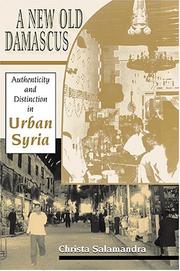| Listing 1 - 3 of 3 |
Sort by
|
Book
ISBN: 9780252083723 9780252050770 9780252042034 0252050770 0252042034 0252083725 Year: 2018 Publisher: Urbana, Ill. University of Illinois Press
Abstract | Keywords | Export | Availability | Bookmark
 Loading...
Loading...Choose an application
- Reference Manager
- EndNote
- RefWorks (Direct export to RefWorks)
A host of international organizations promotes the belief that education will empower Kenya's Maasai girls. Yet the ideas that animate their campaigns often arise from presumptions that reduce the girls themselves to helpless victims of gender-related forms of oppression. Heather D. Switzer's interviews with over 100 Kenyan Maasai schoolgirls challenge the widespread view of education as a silver bullet solution to global poverty. In their own voices, the girls offer incisive insights into their commitments, aspirations, and desires. Switzer weaves this ethnographic material into an astute analysis of historical literature, education and development documents, and theoretical literature.
Kenya --- Educational anthropology --- Women, Maasai --- Maasai (African people) --- Girls, Maasai --- Girls, Masai --- Maasai girls --- Lumbwa (Kenyan and Tanzanian people) --- Maa (Kenyan and Tanzanian people) --- Masai --- Masai (African people) --- Massai (African people) --- Ethnology --- Maasai women --- Women, Masai --- Women, Masai (African people) --- Campus cultures --- Culture and education --- Education and anthropology --- Anthropology --- Culture --- Education --- Social conditions. --- Philosophy --- Kajiado District (Kenya) --- Kajiado, Kenya (District) --- Social conditions --- Girls --- Secondary education --- Book
Book
ISBN: 9780253025470 0253025478 9780253025203 0253025206 Year: 2017 Publisher: Bloomington, Indiana
Abstract | Keywords | Export | Availability | Bookmark
 Loading...
Loading...Choose an application
- Reference Manager
- EndNote
- RefWorks (Direct export to RefWorks)
Despite the easy dismissal by elites of the priorities and perspectives of grassroots women, she shows how Maasai women have always had powerful ways to confront and challenge injustice, express their priorities, and reveal the limits of rights-based legal ideals.
Non-governmental organizations --- Women, Maasai --- Maasai (African people) --- Women's rights --- Customary law --- Maasai women --- Women, Masai --- Women, Masai (African people) --- Customs (Law) --- Folk law --- Usage and custom (Law) --- Social norms --- Common law --- Time immemorial (Law) --- Lumbwa (Kenyan and Tanzanian people) --- Maa (Kenyan and Tanzanian people) --- Masai --- Masai (African people) --- Massai (African people) --- Ethnology --- INGOs (International agencies) --- International non-governmental organizations --- NGOs (International agencies) --- Nongovernmental organizations --- Organizations, Non-governmental (International agencies) --- Private and voluntary organizations (International agencies) --- PVOs (International agencies) --- International agencies --- Nonprofit organizations --- Rights of women --- Women --- Human rights --- Political aspects. --- Social conditions. --- Legal status, laws, etc. --- Social aspects --- Civil rights --- Law and legislation --- menneskerettigheter --- frivillige organisasjoner --- sosiale forhold --- lover --- kvinner --- masai --- Tanzania --- Law, Primitive --- Traditional law

ISBN: 142378958X 0253111218 9780253111210 0253344670 9780253344670 0253217229 9780253217226 0253110416 9780253110411 1282072315 9781282072312 9781423789581 0253345685 9780253345684 0253217628 9780253217622 Year: 2004 Publisher: Bloomington Indiana University Press
Abstract | Keywords | Export | Availability | Bookmark
 Loading...
Loading...Choose an application
- Reference Manager
- EndNote
- RefWorks (Direct export to RefWorks)
""[F]illed with rare encounters with Syria's oldest, most elite families. Critics of anthropology's taste for exoticism and marginality will savor this study of upper-class Damascus, a world that is urbane and cosmopolitan, yet in many ways as remote as the settings in which the best ethnography has traditionally been done.... [Written] with a nuanced appreciation of the cultural forms in question and how Damascenes themselves think, talk about, and create them."" -- Andrew ShryockIn contemporar
Maasai (African people) --- Women, Maasai --- Lumbwa (Kenyan and Tanzanian people) --- Maa (Kenyan and Tanzanian people) --- Masai --- Masai (African people) --- Massai (African people) --- Ethnology --- Maasai women --- Women, Masai --- Women, Masai (African people) --- Religion. --- Religious life --- Congregation of the Holy Ghost --- Catholic Church --- Holy Ghost Fathers --- Congrégation du St. Esprit --- Genossenschaft vom Hl. Geist --- Spiritains --- Spiritans --- Missions --- Ethnology - Syria - Damascus. --- Social structure --- Group identity --- Ethnic & Race Studies --- Gender & Ethnic Studies --- Social Sciences --- Collective identity --- Community identity --- Cultural identity --- Social identity --- Identity (Psychology) --- Social psychology --- Collective memory --- Organization, Social --- Social organization --- Anthropology --- Sociology --- Social institutions --- Cultural anthropology --- Ethnography --- Races of man --- Social anthropology --- Human beings --- Church of Rome --- Roman Catholic Church --- Katholische Kirche --- Katolyt︠s︡ʹka t︠s︡erkva --- Römisch-Katholische Kirche --- Römische Kirche --- Ecclesia Catholica --- Eglise catholique --- Eglise catholique-romaine --- Katolicheskai︠a︡ t︠s︡erkovʹ --- Chiesa cattolica --- Iglesia Católica --- Kościół Katolicki --- Katolicki Kościół --- Kościół Rzymskokatolicki --- Nihon Katorikku Kyōkai --- Katholikē Ekklēsia --- Gereja Katolik --- Kenesiyah ha-Ḳatolit --- Kanisa Katoliki --- כנסיה הקתולית --- כנסייה הקתולית --- 가톨릭교 --- 천주교 --- Damascus (Syria) --- Social life and customs. --- Religious life and customs.
| Listing 1 - 3 of 3 |
Sort by
|

 Search
Search Feedback
Feedback About UniCat
About UniCat  Help
Help News
News